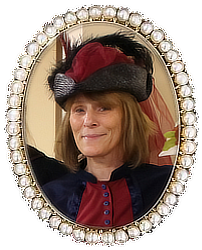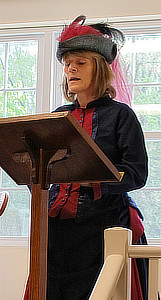
Whittier Cameo
Lucy Larcom
Lucy Larcom

|

|

|
 Played by Cheryl Lassiter
Played by Cheryl Lassiter
 In between my work shifts I liked to read and write poetry. I submitted a poem entitled Sabbath Bells
to The Standard. Whittier, who was the editor at the time, was not interested in the poem - perhaps as a
Quaker he did not approve of church spires and belis....but he wanted to meet me. This began a life
friendship with him and his sister, Elizabeth. John also introduced me to the famous publisher James
Fields, whom he greatly admired, and Mr. Fields ended up publishing my works in the Atlantic Monthly.
John helped a lot of us women writers succeed. Like John, I too was an abolitionist.
As a young woman I went west, eventually settling in Illinois where I taught school until I earned enough
money to enroll at Monticello Female Seminary in Godfrey, Ill. I graduated and earned credentials,
returning east to teach at Wheaton Seminary in Norton, Mass.
Returning back to New England, I edited a children's magazine called Our Young Folks and John sent a
poem to be used in it called In School Days, about a one-room school house in East Haverhill where he
and Lydia Ayer had taken part in a spelling bee. The poem became very famous.
For many years John and I critiqued each other's writings before publication. We wrote some books
together and I even anonymously edited three volumes of his work for the Atlantic Monthly.
You know, I never married because by doing so my legal rights and proceeds from my writing would
have belonged to my husband. You could say that my chief ambition throughout life was maintaining
my middle class respectability while also asserting my right to economic independence through my
education and hard work.
In my 60s, I became ill and John raised money for my support and presented me with cash and an
annuity. I was 65 years old when I wrote my most famous work A New England Girlhood. This book
detailed my life as a Lowell mill worker and is still in print today. When John died he left me the
copyrights to the books we had written together and $500.
In between my work shifts I liked to read and write poetry. I submitted a poem entitled Sabbath Bells
to The Standard. Whittier, who was the editor at the time, was not interested in the poem - perhaps as a
Quaker he did not approve of church spires and belis....but he wanted to meet me. This began a life
friendship with him and his sister, Elizabeth. John also introduced me to the famous publisher James
Fields, whom he greatly admired, and Mr. Fields ended up publishing my works in the Atlantic Monthly.
John helped a lot of us women writers succeed. Like John, I too was an abolitionist.
As a young woman I went west, eventually settling in Illinois where I taught school until I earned enough
money to enroll at Monticello Female Seminary in Godfrey, Ill. I graduated and earned credentials,
returning east to teach at Wheaton Seminary in Norton, Mass.
Returning back to New England, I edited a children's magazine called Our Young Folks and John sent a
poem to be used in it called In School Days, about a one-room school house in East Haverhill where he
and Lydia Ayer had taken part in a spelling bee. The poem became very famous.
For many years John and I critiqued each other's writings before publication. We wrote some books
together and I even anonymously edited three volumes of his work for the Atlantic Monthly.
You know, I never married because by doing so my legal rights and proceeds from my writing would
have belonged to my husband. You could say that my chief ambition throughout life was maintaining
my middle class respectability while also asserting my right to economic independence through my
education and hard work.
In my 60s, I became ill and John raised money for my support and presented me with cash and an
annuity. I was 65 years old when I wrote my most famous work A New England Girlhood. This book
detailed my life as a Lowell mill worker and is still in print today. When John died he left me the
copyrights to the books we had written together and $500.